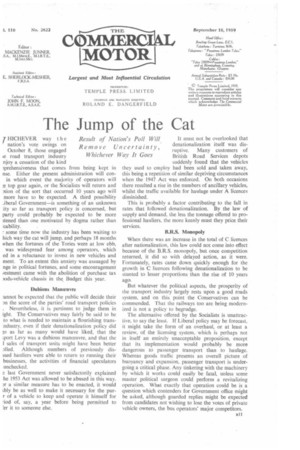The Jump of the Cat
Page 45

If you've noticed an error in this article please click here to report it so we can fix it.
HICHEVER way t h e nation's vote swings on October 8, those engaged te road transport industry njoy a cessation of the kind vehensiveness that comes from being kept in nse. Either the present administration will con in which event the majority of operators will ,e top gear again, or the Socialists will return and 'don of the sort that occurred 10 years ago will more have to be expected. A third possibility ,iberal Government—is something of an unknown ity so far as transport policy is concerned, but party could probably be expected to be more Itened than one motivated by dogma rather than Lcability.
some time now the industry has been waiting to hich way the cat will jump, and perhaps 18 months when the fortunes of the Tories were at low ebb, was widespread fear among operators, which ed in a reluctance to invest in new vehicles and meat, To an extent this anxiety was assuaged by nge in political fortunes, and some encouragement /estment came with the abolition of purchase tax )ods-vehicle chassis in the Budget this year.
Dubious Manoeuvre :annot be expected that the public will decide their mi the score of the parties' road transport policies . Nevertheless, it is pertinent to judge them in ight. The Conservatives may fairly be said to be to what is needed to maintain a flourishing transndustry, even if their denationalization policy did ;o as far as many would have liked, that the Tort Levy was a dubious manceuvre, and that the 1 sales of transport units might have been better piled. Although numbers of previously disssed hauliers were able to return to running their businesses, the activities of financial speculators unchecked.
e last Government never satisfactorily explained he 1953 Act was allowed to be abused in this way.
a similar measure has to be enacted, it would ibly be as well to make it necessary for the purr of a vehicle to keep and operate it himself for iod of, say, a year before being permitted to :et' it to someone else. It must not be overlooked that denationalization itself was disruptive. Many customers of British Road Services depots suddenly found that the vehicles they used to employ had been sold and taken away, this being a repetition of similar depriving circumstances when the 1947 Act was enforced. On both occasions there resulted a rise in the numbers of ancillary vehicles, whilst the traffic available for haulage under A licences diminished.
This is probably a factor contributing to the fall in rates that followed denationalization. By the law of supply and demand, the less the tonnage offered to professional hauliers, the more keenly must they price their services.
B.R.S. Monopoly When there was an increase in the total of C licences after nationalization, this law could not come into effect because of the B.R.S. monopoly, but once competition returned, it did so with delayed action, as it were. Fortunately, rates came down quickly enough for the growth in C licences following denationalization to be stunted to lesser proportions than the rise of 10 years ago.
But whatever the political aspects, the prosperity of the transport industry largely rests upon a good roads system, and on this point the Conservatives can be commended. That the railways too are being modernized is not a policy to begrudge.
The alternative offered by the Socialists is unattractive, to say the least. If Liberal policy may be forecast, it might take the form of an overhaul, or at least a review, of the licensing system, which is perhaps not in itself an entirely unacceptable proposition, except that its implementation would probably be more dangerous to passenger transport than to haulage_ Whereas goods traffic presents an overall picture of buoyancy and expansion, passenger transport is undergoing a critical phase. Any tinkering with the machinery by which it works could easily be fatal, unless some master political surgeon could perform a revitalizing operation. What exactly that operation could be is a question which contenders for Government office might be asked, although guarded replies might be expected from candidates not wishing to lose the votes of private vehicle owners, the bus operators' major competitors.




































































































































